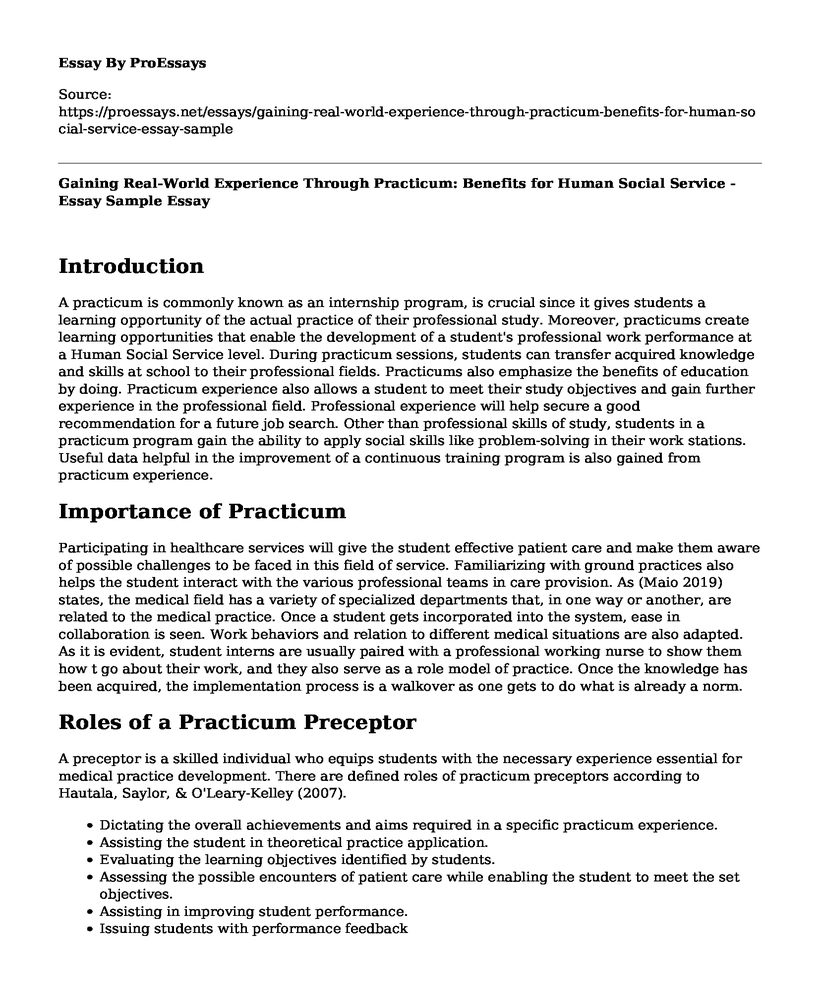Introduction
A practicum is commonly known as an internship program, is crucial since it gives students a learning opportunity of the actual practice of their professional study. Moreover, practicums create learning opportunities that enable the development of a student's professional work performance at a Human Social Service level. During practicum sessions, students can transfer acquired knowledge and skills at school to their professional fields. Practicums also emphasize the benefits of education by doing. Practicum experience also allows a student to meet their study objectives and gain further experience in the professional field. Professional experience will help secure a good recommendation for a future job search. Other than professional skills of study, students in a practicum program gain the ability to apply social skills like problem-solving in their work stations. Useful data helpful in the improvement of a continuous training program is also gained from practicum experience.
Importance of Practicum
Participating in healthcare services will give the student effective patient care and make them aware of possible challenges to be faced in this field of service. Familiarizing with ground practices also helps the student interact with the various professional teams in care provision. As (Maio 2019) states, the medical field has a variety of specialized departments that, in one way or another, are related to the medical practice. Once a student gets incorporated into the system, ease in collaboration is seen. Work behaviors and relation to different medical situations are also adapted. As it is evident, student interns are usually paired with a professional working nurse to show them how t go about their work, and they also serve as a role model of practice. Once the knowledge has been acquired, the implementation process is a walkover as one gets to do what is already a norm.
Roles of a Practicum Preceptor
A preceptor is a skilled individual who equips students with the necessary experience essential for medical practice development. There are defined roles of practicum preceptors according to Hautala, Saylor, & O'Leary-Kelley (2007).
- Dictating the overall achievements and aims required in a specific practicum experience.
- Assisting the student in theoretical practice application.
- Evaluating the learning objectives identified by students.
- Assessing the possible encounters of patient care while enabling the student to meet the set objectives.
- Assisting in improving student performance.
- Issuing students with performance feedback
- Uses the recommended teaching techniques in assisting students to meet or understand set objectives.
- Availing continuous evaluation records of the student's regular performance.
- Aiding the institution with the evaluation process regarding student's performance during practicum sessions.
Personal Growth and Development in PMHNP
There are three significant stages of development in the PMHNP. These are; the cognitive, physical and psychosocial development stages (Weber, Delaney, & Snow, 2016). The "cognitive" stage of development involves monitoring of a child from birth to a period of 12 years. This stage is subdivided into 6 sub-stages. In the first stage, "sensorimotor thought," involves a child's ability to operate tangible substances. Secondly, there is the preoperational and symbolic functioning stage whereby a child's language develops progressively. In the third stage, "concrete operations," the child gains the ability to reason logically and solve problems. Lastly is the "formal operations" stage, where a child has a fully developed potential of problem-solving and complexity in thinking. I psychosocial development as states, there are various development signs and factors that enable age groupings like infants, toddlers, preschool, school-age, adolescent, young adult, middle-aged adult, and older adults' group (Weber, Delaney, & Snow, 2016). Specific ages determine these groups and allow a developmental study to be adequately conducted. They are useful for sorting out of data and proper diagnosis of the percentage of attention needed to be supplied in terms of needs and special care.
References
Hautala, K. T., Saylor, C. R., & O'Leary-Kelley, C. (2007). Nurses' perceptions of stress and support in the preceptor role. Journal for Nurses in Professional Development, 23(2), 64-70.
Maio, J. (2019). 10 Reasons Why An Internship is Important to All Students. Retrieved 24 November 2019, from https://blog.suny.edu/2018/06/10-reasons-why-an-internship-is-important-to-all-students/
Weber, M. T., Delaney, K. R., & Snow, D. (2016). Integrating the 2013 Psychiatric Mental Health NP competencies into educational programs: Where are we now?. Archives of Psychiatric Nursing, 30(3), 425-431.
Cite this page
Gaining Real-World Experience Through Practicum: Benefits for Human Social Service - Essay Sample. (2023, Mar 04). Retrieved from https://proessays.net/essays/gaining-real-world-experience-through-practicum-benefits-for-human-social-service-essay-sample
If you are the original author of this essay and no longer wish to have it published on the ProEssays website, please click below to request its removal:
- Nursing Leadership: Reflection Paper Example
- Report Example on Food Processing Plant Hygiene
- Personal Opinion Related to Recommendation on Nursing
- Social Constructivism Paper Example
- Perceived Employable Soft Skills Between Employers and MBA Students Paper Example
- Essay on Young Dreamer's Mission to Become a Doctor: A Journey of Dedication, Empathy, and Curiosity
- Paper Example on Maximizing Room Occupancy at Guards Polo Club







